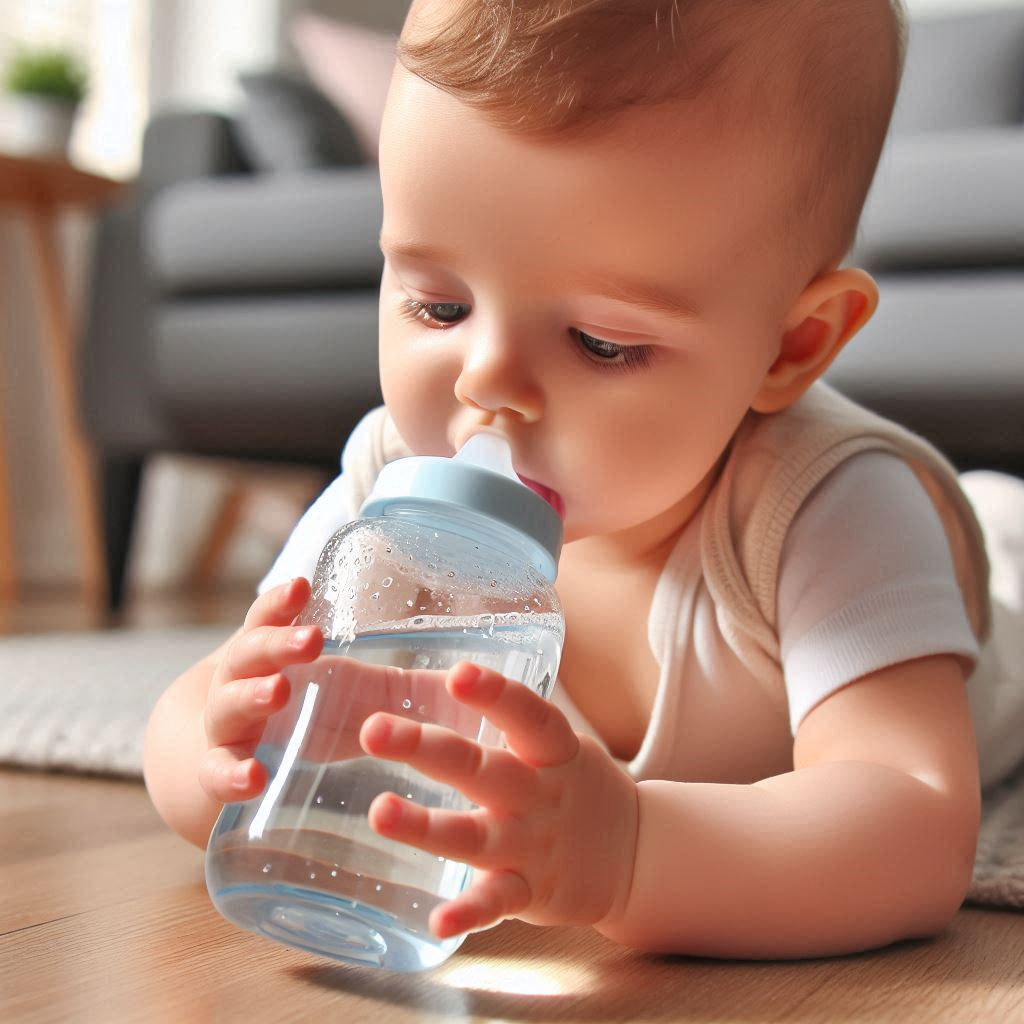Can a 6-Month-Old Baby Have Water?
As a new parent, you’re always looking out for your baby’s health and well-being. One question that often comes up is when it’s safe to introduce water to your little one’s diet. Let’s dive into this important topic and explore everything you need to know about giving water to your 6-month-old baby.
Quick Answer
Yes, a 6-month-old baby can have small amounts of water, but it should be introduced gradually and in limited quantities. Breast milk or formula should still be the main source of hydration and nutrition.
The Importance of Proper Hydration for Babies
Keeping your baby well-hydrated is crucial for their health and development. But here’s the thing: babies under 6 months old don’t actually need any extra water. Their tiny bodies get all the hydration they need from breast milk or formula. It’s like nature’s perfect package deal!
Why Breast Milk and Formula Are Enough
Breast milk and formula are more than just food for your baby. They’re perfectly balanced to provide the right amount of fluids, nutrients, and calories your little one needs to grow and thrive. It’s pretty amazing when you think about it – these liquids are tailored to meet all your baby’s needs in those early months.
When Can Babies Start Drinking Water?
The magic number here is 6 months. That’s when most babies are ready to start exploring the world of solid foods and can safely have small sips of water. But don’t worry, we’re not talking about replacing their milk with water – it’s just a little addition to their diet.
Read More Here: How to Avoid Water Intoxication for Baby
Why Wait Until 6 Months?
You might be wondering, “What’s the big deal about waiting?” Well, there are some pretty important reasons:
- Developing kidneys: Your baby’s kidneys are still figuring things out in those first 6 months. They’re not quite ready to handle plain water just yet.
- Risk of water intoxication: This might sound scary, but it’s just a fancy way of saying that too much water can mess with the balance of electrolytes in your baby’s body.
- Nutrient needs: Filling up on water might mean your baby drinks less breast milk or formula, which could lead to them missing out on important nutrients.
How Much Water Can a 6-Month-Old Baby Have?
Once your baby hits that 6-month milestone, you can start offering small amounts of water. But we’re talking really small here – like a few sips from a cup with meals. The goal isn’t to quench their thirst (that’s still the job of breast milk or formula), but to get them used to the taste and the idea of drinking from a cup.
A Gradual Introduction
Start with about 1-2 ounces (that’s 30-60 ml for our metric friends) of water a day. As your baby gets older and eats more solid foods, you can slowly increase this amount. But remember, breast milk or formula should still be the main event until your baby is at least a year old.
Signs Your Baby Is Ready for Water
How do you know if your baby is ready for those first sips of water? Look out for these signs:
- They can sit up without much help
- They’re showing interest in what you’re eating and drinking
- They can swallow food without pushing it out with their tongue
- They’re starting to grab at cups or bottles
Read More Here: Signs that my Baby is Dehydrated
How to Offer Water to a Baby
Alright, so you’ve decided it’s time to introduce water. But how do you go about it? Here are some tips to make the process smooth and safe:
Choose the Right Cup
Look for a small, soft-spout sippy cup or an open cup designed for babies. These are easier for little hands and mouths to manage. Plus, learning to drink from a cup is an important skill for your baby to develop.
Timing Is Everything
Offer water after meals, not before. This way, you’re not filling up your baby’s tummy with water when it should be getting filled with nutrient-rich food and milk.
Make It a Positive Experience
Drinking water should be fun, not stressful. Smile, make encouraging noises, and praise your baby for their efforts. Remember, this is all new to them!
Personal Anecdote: Our Water Adventure
I remember the first time I offered my daughter, Emma, water at 6 months old. I was so excited, thinking it was going to be this big, momentous occasion. I had her favorite bib on, a cute little cup ready, and my camera poised for the perfect shot.
Well, let me tell you, it didn’t go quite as planned! Emma looked at the cup like it was from outer space. When I finally got her to take a sip, she made the funniest face – somewhere between confusion and “What on earth is this stuff?” It wasn’t the picture-perfect moment I’d imagined, but it was real and hilarious.
Over the next few weeks, we kept at it. Slowly but surely, Emma got used to the idea of water. Now, at 18 months, she loves her water and even asks for it by name (well, “wa-wa”, but close enough). It just goes to show that these milestones often don’t happen overnight, but with patience and persistence, we get there!
Potential Risks of Giving Water Too Early
While water is essential for life, giving it to babies too early can actually be harmful. Here’s why:
Water Intoxication
This might sound like something out of a sci-fi movie, but it’s a real risk for babies. Their tiny kidneys aren’t equipped to handle too much water, which can lead to an imbalance in their body’s sodium levels. This can cause seizures, coma, or even death in severe cases.
Reduced Nutrient Intake
A baby’s stomach is tiny – about the size of their fist. If you fill it up with water, there’s less room for the nutrient-rich breast milk or formula they need to grow and develop properly.
Interference with Breastfeeding
For breastfed babies, introducing water too early can interfere with the natural supply and demand cycle of breastfeeding. This could lead to a decrease in milk supply, which isn’t what you want in those crucial early months.
Safe Water Sources for Babies
When it’s time to introduce water, you want to make sure you’re using a safe source. Here are some options:
- Tap water: In most developed countries, tap water is safe for babies. However, it’s a good idea to let it run for a few seconds before collecting it, and to use cold water rather than hot.
- Bottled water: Look for brands that are specifically marketed for babies or for making up formula. These have strict regulations about mineral content.
- Boiled water: If you’re unsure about your water quality, boiling it for at least one minute and then cooling it is a safe bet.
Remember, no matter what source you choose, always let the water cool to room temperature before giving it to your baby.
Read More Here: How to Bathe an Infant Without a Tub: Safe and Simple Methods
Water and Solid Foods
As you start introducing solid foods around 6 months, you might notice your baby getting thirstier. This is normal! Solid foods often have less water content than breast milk or formula, so a few sips of water with meals can help with digestion and prevent constipation.
Balancing Act: Water, Milk, and Solids
It’s all about balance. As your baby eats more solids, they’ll naturally drink less milk. Water can help fill in the gaps, but it shouldn’t replace milk feeds entirely. Think of it as a supporting actor, not the star of the show.
When to Consult a Doctor
While introducing water is usually a smooth process, there are times when you should check in with your pediatrician:
- If your baby refuses water or seems unusually thirsty
- If you notice changes in diaper output (much less or much more)
- If your baby shows signs of dehydration like dry mouth, lack of tears, or sunken soft spot
- If you have any concerns about your baby’s growth or development
Conclusion: Sip by Sip
Introducing water to your 6-month-old baby is an exciting milestone, but it’s one that should be approached with care and patience. Remember, every baby is different, and there’s no rush. The most important thing is to follow your baby’s cues and your pediatrician’s advice.
Start small, be consistent, and before you know it, your little one will be happily sipping away. And who knows? Maybe one day they’ll even remind you to stay hydrated!
Next Steps for Parents
- Talk to your pediatrician about introducing water at your baby’s 6-month check-up
- Choose a suitable cup for your baby
- Start offering small sips of water with solid foods
- Keep track of your baby’s reactions and adjust as needed
- Celebrate this new milestone in your baby’s development!
Remember, you’re doing a great job navigating this parenting journey. Take it one day at a time, and don’t forget to enjoy all these little moments of growth and discovery with your baby!

Jessica Winter is a passionate parenting blogger with two years of experience guiding new and seasoned parents through the joys and challenges of raising babies. Her insightful posts blend personal anecdotes with expert advice to offer a warm and practical perspective on modern parenting.

